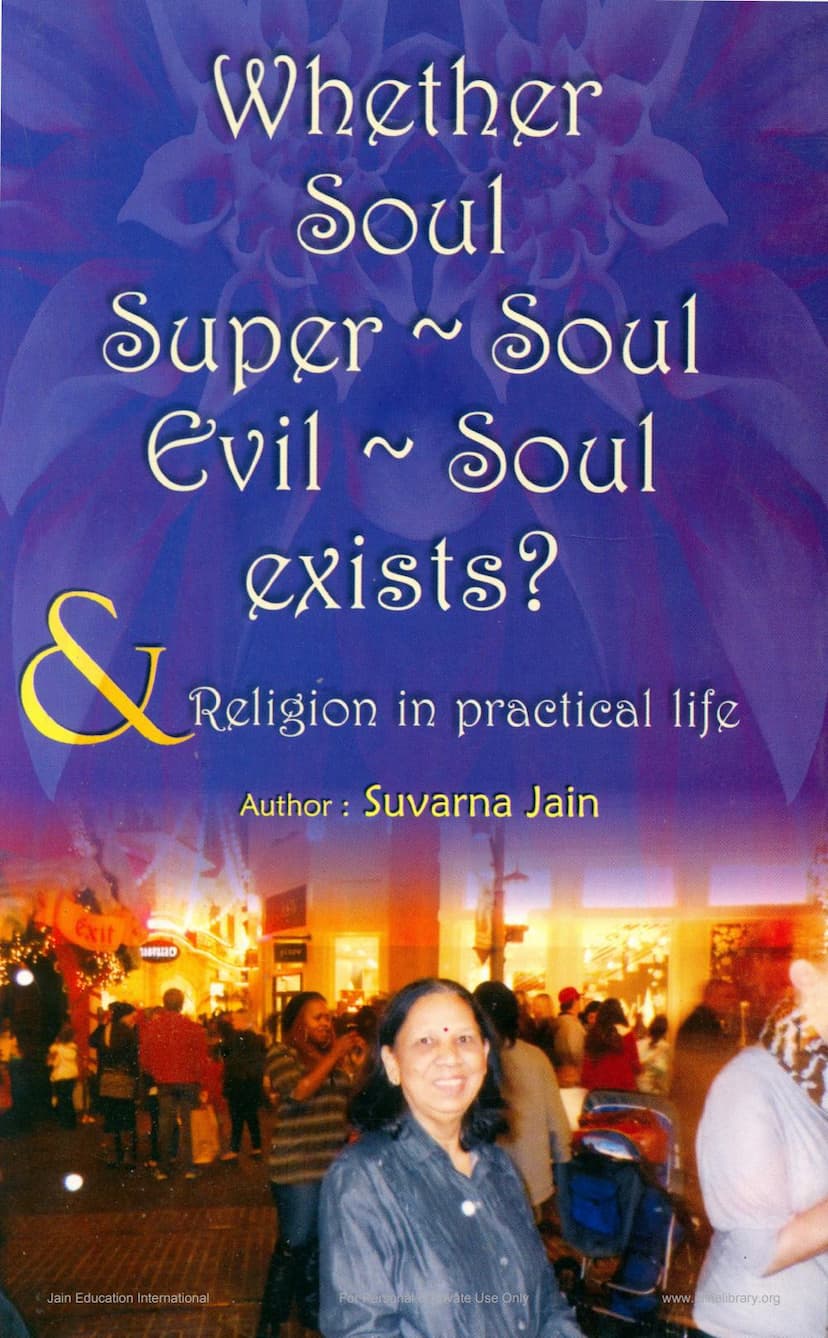Whether Soul Super Soul Evil Soul Exists
Added to library: September 2, 2025

Summary
This Jain text, titled "Whether Soul, Super Soul, Evil Soul exists? & Religion in Practical Life" by Suvarna Jain, offers a comprehensive exploration of religious concepts and their application in contemporary life. The book delves into fundamental questions about the existence of the soul, super soul, and evil soul, and critically examines the role of religion in various aspects of human existence, from personal ethics to societal structures.
Key Themes and Arguments:
-
Defining Religion: The book begins by defining religion through various philosophical and theological lenses. It highlights religion's role in the quest for truth, adherence to moral principles, recognition of higher powers, and its influence on daily life, shaping beliefs, practices, rituals, and ethics. Religion is also presented as a source of inspiration for art and architecture, fostering personal growth, peace of mind, and a sense of duty and responsibility towards others.
-
Critique of Blind Faith and Dogma: The author emphasizes the need for a rational and intellectual approach to religion, urging readers to separate essential truths from blind faith, superstition, and fanaticism. She advocates for modernity's reliance on logic and reason over dogma and blind belief, suggesting a shift towards spirituality that prioritizes love, justice, and mutual understanding.
-
The Existence of God and Supernatural Entities: The text critically analyzes the concept of God across various religions, presenting different theological viewpoints and arguments for and against God's existence. It explores philosophical arguments for and against God, including causality, the design argument, and the problem of evil. The author also scrutinizes the belief in supernatural entities like ghosts, attributing many perceived experiences to natural phenomena, psychological states, or misinterpretations.
-
The Nature of the Soul and Consciousness: The book delves into the complex and often debated concept of the soul and consciousness. It examines various philosophical and scientific perspectives, from ancient Indian philosophies like Sankhya and Advaita Vedanta to modern neurological and psychological theories. The author questions the existence of a disembodied soul or consciousness after death, leaning towards explanations rooted in biology and brain function.
-
Dreams, Mystical Experiences, and Near-Death Experiences (NDEs): The text explores the psychological and physiological explanations behind dreams, mystical experiences, and NDEs. It suggests that these phenomena can often be attributed to brain chemistry, psychological states, cultural conditioning, or the brain's attempt to process trauma or stress, rather than proof of an afterlife or supernatural encounters.
-
Biological Violence and Ethical Dilemmas: A significant portion of the book is dedicated to examining biological violence, particularly abortion. The author presents a strong ethical argument against abortion based on Jain principles of non-violence (Ahimsa) and the sanctity of life from conception. She critiques various justifications for abortion and explores the complex ethical issues surrounding contraception, genetic engineering, cloning, and organ transplantation.
-
Jain Ethics and Practical Application (Jainacara): The book emphasizes the practical application of Jain ethics in daily life. It highlights how Jain principles like non-violence (Ahimsa), non-possession (Aparigraha), truthfulness (Satya), non-stealing (Asteya), and celibacy (Brahmacharya), along with practices like vegetarianism, fasting, and meditation, contribute to physical and mental well-being, ecological harmony, and spiritual growth.
-
Ecological Violence and Environmental Harmony: The author addresses the critical issue of ecological violence caused by human activities like industrialization, overconsumption, and pollution. She advocates for a Jain approach of minimal needs, non-possession, and reverence for all life forms to maintain ecological balance and promote environmental sustainability, highlighting the interconnectedness of all living beings.
-
Political Violence and Terrorism: The book critically examines political violence and terrorism, particularly in the context of religious extremism and misinterpretations of religious texts. It analyzes how political and economic factors can fuel violence, leading to conflict and suffering, and emphasizes the importance of peace, tolerance, and rational understanding over blind faith and coercion.
-
Euthanasia and the Right to Die: The text engages with the complex ethical and legal debate surrounding euthanasia and physician-assisted suicide. It presents various viewpoints, including religious, philosophical, and medical perspectives, questioning the morality of intentionally ending life and highlighting the potential for abuse and the importance of preserving life with dignity.
-
Surrogacy and "Babies as Fast Food": The author critically examines the practice of surrogacy, likening it to "fast food" in its commodification of human life. She argues that while surrogacy may offer solutions for infertility, it raises significant ethical concerns regarding exploitation, the commercialization of human bodies, and the separation of reproduction from traditional family structures.
-
AIDS and its Transmission: The book touches upon the transmission of AIDS and discusses the ethical questions surrounding testing, confidentiality, and preventive measures, including the Jain principle of celibacy as a means to curtail the spread of the disease.
Overall Message:
"Whether Soul, Super Soul, Evil Soul exists? & Religion in Practical Life" is a thought-provoking work that encourages a critical and rational engagement with religious and philosophical concepts. Suvarna Jain advocates for a practical, ethical, and non-violent approach to life, emphasizing the importance of compassion, tolerance, self-discipline, and a harmonious relationship with nature and all living beings. The book serves as a guide for readers to integrate religious principles into their daily lives, promoting personal growth, societal well-being, and a deeper understanding of one's place in the universe.